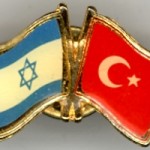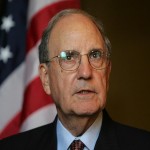Monday
Oct192009
Israel: Barak Repairing Position with US Government on Palestine Talks?
 Monday, October 19, 2009 at 11:30
Monday, October 19, 2009 at 11:30
Receive our latest updates by email or RSS SUBSCRIBE TO OUR FEED
Buy Us A Cup of Coffee? Help Enduring America Expand Its Coverage and Analysis
 On Sunday, Defense Minister Ehud Barak called on government officials to coordinate with the United States to renew talks with the Palestinian Authority: "We must work with the American administration and consolidate an agreement to open negotiations as soon as possible, even if the conditions aren't perfect and even if we have to make difficult concessions."
On Sunday, Defense Minister Ehud Barak called on government officials to coordinate with the United States to renew talks with the Palestinian Authority: "We must work with the American administration and consolidate an agreement to open negotiations as soon as possible, even if the conditions aren't perfect and even if we have to make difficult concessions."
Although Barak's suggestion follows the recent, inconclusive trip of President Obama's special envoy George Mitchell to Israel and Palestine, it may be spurred even more by domestic political considerations. Barak is enjoying a favourable wind, as Minister Avigdor Lieberman and possibly Prime Minister Benjamin Netanyahu may be in trouble with Washington over their resistance to US demands for a full settlement freeze in the West Bank. If the Labour Party's top politician sees this spilling over into discontent amongst Israeli voters, he may be willing to push his position against his coaliation partners.
Buy Us A Cup of Coffee? Help Enduring America Expand Its Coverage and Analysis
 On Sunday, Defense Minister Ehud Barak called on government officials to coordinate with the United States to renew talks with the Palestinian Authority: "We must work with the American administration and consolidate an agreement to open negotiations as soon as possible, even if the conditions aren't perfect and even if we have to make difficult concessions."
On Sunday, Defense Minister Ehud Barak called on government officials to coordinate with the United States to renew talks with the Palestinian Authority: "We must work with the American administration and consolidate an agreement to open negotiations as soon as possible, even if the conditions aren't perfect and even if we have to make difficult concessions."Although Barak's suggestion follows the recent, inconclusive trip of President Obama's special envoy George Mitchell to Israel and Palestine, it may be spurred even more by domestic political considerations. Barak is enjoying a favourable wind, as Minister Avigdor Lieberman and possibly Prime Minister Benjamin Netanyahu may be in trouble with Washington over their resistance to US demands for a full settlement freeze in the West Bank. If the Labour Party's top politician sees this spilling over into discontent amongst Israeli voters, he may be willing to push his position against his coaliation partners.

 On Friday,
On Friday,  On Sunday, Ankara made a dramatic last-minute decision to bar Israel from an international military exercise on Turkish soil. Israeli leaders see the decision as a political response linking to Turkey's continuing criticisms over Israel's military operations in Gaza.
On Sunday, Ankara made a dramatic last-minute decision to bar Israel from an international military exercise on Turkish soil. Israeli leaders see the decision as a political response linking to Turkey's continuing criticisms over Israel's military operations in Gaza. On Sunday,
On Sunday,  President Obama's special envoy for the Middle East, George Mitchell, is back in Israel. He held talks with Israeli Defense Minister Ehud Barak and President Shimon Peres on Thursday and is expected to meet Prime Minister Benjamin Netanyahu today before moving to the West Bank to speak with Palestinian Authority leader Mahmoud Abbas this weekend.
President Obama's special envoy for the Middle East, George Mitchell, is back in Israel. He held talks with Israeli Defense Minister Ehud Barak and President Shimon Peres on Thursday and is expected to meet Prime Minister Benjamin Netanyahu today before moving to the West Bank to speak with Palestinian Authority leader Mahmoud Abbas this weekend.